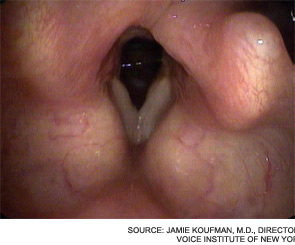Allergic rhinitis among the elderly poses a particularly difficult diagnostic challenge for the otolaryngologist. As people age, they undergo immunosenescence. The thymus, which produces T cells against new invaders, atrophies markedly after adolescence, and this decline results in a less robust immune response to bacteria, viruses and presumably allergens (J Pathol. 2007;211(2):144-156). Consequently, physicians have assumed that allergies should decline as people age.

A Tailored Approach to Dizziness: Take extra caution and care in the elderly, panelists say
Dizziness is a particular danger among the elderly, but extra care taken by physicians can help ease their problems and help keep older patients functioning, panelists said at the 2010 Annual Meeting of the American Academy of Otolaryngology-Head and Neck Surgery, held here Sept. 26-29.
New Study Presents Education Opportunity: Nasal zinc side effects spark discussions about alternative treatments
Arecent study in Archives of Otolaryngology-Head and Neck Surgery on the potential side effects of nasal zinc therapies is the newest staging ground in the debate over how otolaryngologists can advise patients on the benefits of homeopathic treatments in the context of the common cold.

Progress in Chronic Laryngitis: Improvement in diagnosis but continuing debate
Chronic laryngitis is a multifactorial disease with a large differential diagnosis for the patient who presents with hoarseness. Fortunately, the diagnosis of inflamed larynx has improved in recent years.
Demystifying the ACGME: Your guide to understanding the residency accreditation body
ACGME RRC—this litany of letters means little to most otolaryngologists. However, whether you are a private practitioner or an academician, a resident in training or a program director, you should have a basic understanding of the work done by the Accreditation Council for Graduate Medical Education Residency Review Committee (ACGME RRC).
The Faculty Mentor from the Resident’s Perspective
What is the experience of residents regarding mentorship during their otolaryngology residency? Background: Integral to the educational experience is the relationship between faculty and residents, which is based upon multiple types […]

The Great Debate: Canal-wall-up vs. canal-wall-down surgery for pediatric cholesteatomas
Treating Allergic Rhinitis: A Patient Experiment
Berrylin J. Ferguson, MD, FACS, FAAOA, associate professor of otolaryngology and director of the Division of Sino-Nasal Disorders and Allergy at the University of Pittsburgh School of Medicine in Pittsburgh, Pa., uses the following form to help determine which allergy treatments will work best for each patient.

Mission Possible: Humanitarian work allows otolaryngologists to enact change
Performing international surgical outreach missions to help the world’s most disadvantaged patients overcome the disability imposed by disease is an extremely rewarding experience. Missions are challenging, varying in their length, level of working and living conditions and the surgery performed. Despite the rigors of mission work, there has not been a mission where members of the medical team did not find the experience to be life changing.

Alternative Remedies for Chronic Rhinosinusitis: Are complementary and alternative treatments harmful or advisable?
Laurie McCombs, 53, has dealt with sinus problems nearly all of her adult life. Clogged sino-nasal passages made it difficult for her to breathe at night, and the congestion caused morning pressure headaches. Over-the-counter and prescription antihistamines muted her symptoms but did not address their cause. At the age of 40, she decided to take the advice of friends who had experienced relief with acupuncture. Now McCombs follows the advice of the acupuncturist, who diagnosed her with allergies to dairy products and yeast, by limiting her intake of breads and milk products. She also continues to take loratadine and has found saline irrigation with the neti pot helpful in clearing her sinuses.
- « Previous Page
- 1
- …
- 13
- 14
- 15
- 16
- 17
- …
- 35
- Next Page »